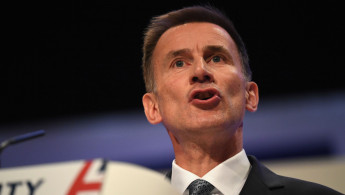Syria's 'butcher' Assad likely to remain in power, says UK foreign minister
UK Foreign Secretary Jeremy Hunt said on Thursday that Syrian President Bashar al-Assad is likely to remain in power for some time due to Russia's backing for the Damascus regime.
But Hunt warned that Syria would be unlikely to see peace while under Assad remains in power and that Russia may have gained a "sphere of influence" by supporting the regime.
"I think... we won't have lasting peace in Syria with that (Assad's) regime, but regretfully we do think he's going to be around for a while and that is because of the support that he's had from Russia," Hunt told Sky News.
"Russia may think that it's gained a sphere of influence, what we would say to them is yes, and you've also gained a responsibility and if you're going to be involved in Syria then you need to make sure that there really is peace in Syria."
Hunt referred to Assad as a "butcher" for using chemical weapons against his own people and that Moscow now had a responsibility to rein in the Syrian president's brutal attacks on civilians.
"That means making sure that President Assad does not use chemical weapons on his own people, whether it's in the Kurdish areas or Idlib or anywhere else," he said.
"And this is a man who has shown no scruples whatsoever about using these horrific weapons. So that is very much a ball in the Russian court now."
The foreign secretary added that the UK is leading the charge against the use of chemical weapons and that US President Donald Trump had also made it clear he would not tolerate their use.
"There has to be a clear, red line against the use of chemical weapons," Hunt said from Malaysia - the second stop on his three-day visit to Asia.
When questioned on whether the UK might follow the UAE's lead and open its embassy in Damascus, he said "I think we're a long way off that happening".
"I could understand why people can see that having wanted, as we really did, want to get rid of Assad, because he is a butcher who was prepared to use chemical weapons against his own people but because of the support that he's had from Russia he's been able to consolidate his position," he added.
"There'll be many people in Syria who are bitterly disappointed that that has been the outcome. But if that is the outcome, then there are going to be countries that want to re-establish diplomatic ties."
Arab countries - including the UAE, Bahrain, Sudan and Tunisia - have shown signs of normalising ties with the Assad regime following a brutal civil war, which has killed at least half-a-million people since 2011 - the vast majority civilians.
Bashar al-Assad's forces are thought to be responsible for the vast majority of killings, which have included the indiscriminate bombing of civilian areas and the use of chemical weapons.
Syrian diplomats were expelled from London and many other western capitals in 2012, when regime troops opened fire on protesters and launched brutal massacres on civilian areas.
Since Moscow's intervention in 2015, a cornered Assad has managed to win back control of most of the country, mostly thanks to Russian air power and Iranian ground support.





 Follow the Middle East's top stories in English at The New Arab on Google News
Follow the Middle East's top stories in English at The New Arab on Google News


